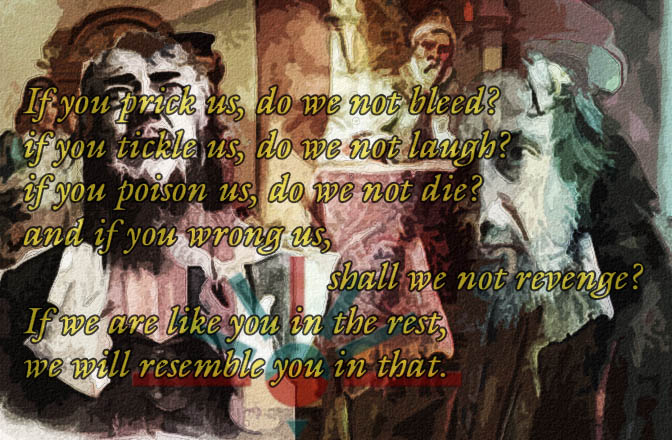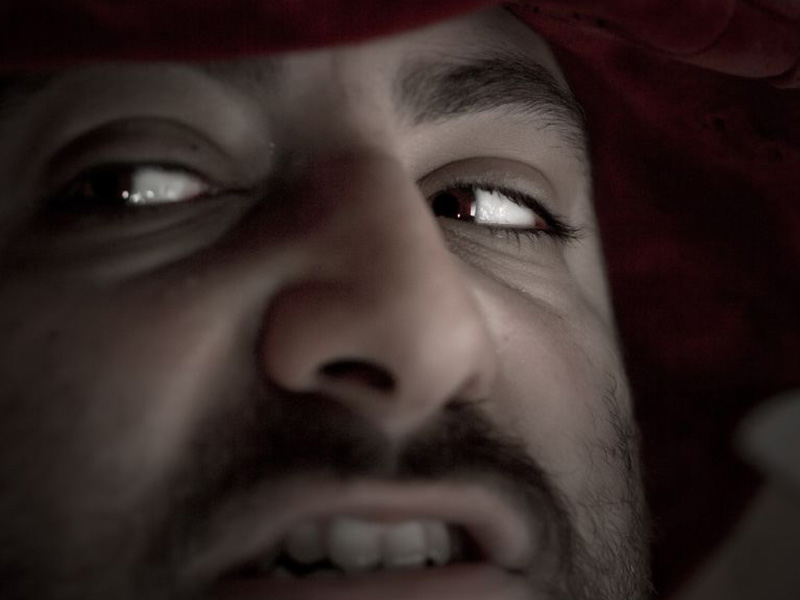William Shakespeare’s plays are among the world’s finest examples of English prose. While the authorship of The Merchant of Venice remains a matter of dispute, what the Bard (or the Earl of Oxford, Sir Francis Bacon, Christopher Marlowe or other possible scribes) had in mind for the character Shylock has long been a popular topic for debate.
The Jewish moneylender in the Shakespearean comedy has served as a highly controversial character for more than five centuries. He’s been used as a symbol in anti-Semitic campaigns, including in Nazi Germany.
Yet, there’s far more to Shylock than meets the eye.
In the play, he loans money to his rival Antonio, a nobleman who has agreed to be a guarantor to help his friend Bassanio win the affections of Portia. The loan is secured in a most peculiar way: a pound of Antonio’s flesh near his heart.

When Antonio, who has exhibited anti-Semitic behaviour, defaults on the loan, Shylock attempts to collect his fleshy prize. His frustration mounts when his daughter Jessica falls in love with Antonio’s friend, Lorenzo, and converts to Christianity.
Shylock is ultimately unsuccessful thanks to Portia, who discovers a technicality in the contract: Shylock can remove Antonio’s flesh, but not a drop of blood can be shed. At the same time, Portia reveals the Jewish moneylender, as an “alien,” has forfeited his property by threatening a Venetian citizen’s life.
The Duke of Venice, at Antonio’s request, commutes the sentence to half of his property on two conditions: Shylock must immediately convert to Christianity, and he must bequeath his estate to Jessica and Lorenzo. Shylock agrees, claims to have an illness and quickly exits the stage.
THE JEWISH COMMIC WHOSE FATHER TOLD HIM JOY ‘DOESN’T EXIST’
Some observers believe Shylock is the quintessential Shakespearean villain, an evil Jew obsessed with money who can only be properly saved by converting to Christianity. Others look at him as a tragic or sympathetic character, universally hated for his religion and fighting for survival the only way he can.
The Forward’s Benjamin Ivry noted in a March 16, 2017 piece that “Jewish actors and directors have been drawn to the play.”
Ivry interviewed the University of Iowa’s Prof. Miriam Gilbert, a lecturer at the Shakespeare Birthplace Trust in Stratford-upon-Avon, and they discussed how some Jewish actors have tried to explain Shylock to audiences. This includes David Suchet’s “ferocious portrayal” (like Shylock, Suchet later converted to Christianity), Dustin Hoffman’s “lukewarm” performance of a “cowering and physically intimidated” figure and Henry Goodman’s assessment of the Jewish moneylender as a “scheming, dangerous man.”
Who is the “real” Shylock? Anthony Holden’s book William Shakespeare: His Life and Work holds a vital clue.
His assessment of Shylock’s role is intriguing. “Partly through centuries of sensitivity to charges of anti-Semitism, partly because the role is one of those Shakespearean wonders which has offered such opportunities to actors down the centuries,” Holden writes, “the character of Shylock himself has since loomed too large in responses to The Merchant of Venice.”
It’s a fair point, since Shylock only appears in five of the play’s 20 scenes, speaking only about 360 lines.
Yet, Shylock has gradually attained the mystique of a larger-than-life fictional figure. “It is almost as if Shakespeare wrote the part of Shylock too well, more powerfully than even he himself realized,” noted Holden, “creating not merely a show-stealing part for an actor, but what has been called the first of Shakespeare’s ‘internalized’ hero-villains.”
Indeed, various interpretations of this hero-villain on the silver screen and stage have depicted a multifaceted character with enormous flaws and a surprising number of principles. To write him off as the embodiment of Jew-hatred and little else is, therefore, far too simplistic and narrow-minded.
“Hath not a Jew eyes?” asks Shylock at one point.
We do, and it’s time to open them a bit wider.
